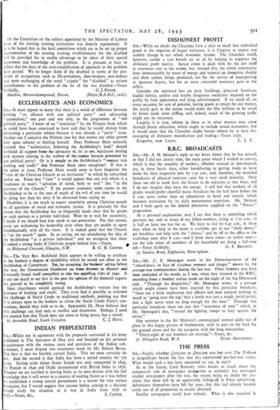THE PRESS
SIR,—Surely, whether £300,000 or £600,000 was lost over The Tribune is insignificant beside the fact that this represented pre-last-war values. What would such a loss have amounted to, say, in 1937?
As to the future, Lord Kemsley (who knows as much about the commercial side of newspaper production as anybody) has envisaged smaller newspapers after the war, the reason being no doubt the cer- tainty that there will be an appreciable falling-off in Press advertising. Advertisers themselves have felt for years that this had already become costly out of all proportion to results obtained.
Smaller newspapers could hurt nobody. What is also required is
more newspapers, if the free expression of public opinion is to be achieved. And what prevents the launching of more newspapers is the cost of newsprint, which accounts for about two-thirds of the cost of newspaper production. Thus, cheaper and cheaper newsprint is the key to a healthier and freer Press-in the future. Perhaps it is here that the Government or a public utility corporation could perform a real service to the community.—Yours, &c., CECIL FALCON. Sheffield.



























 Previous page
Previous page